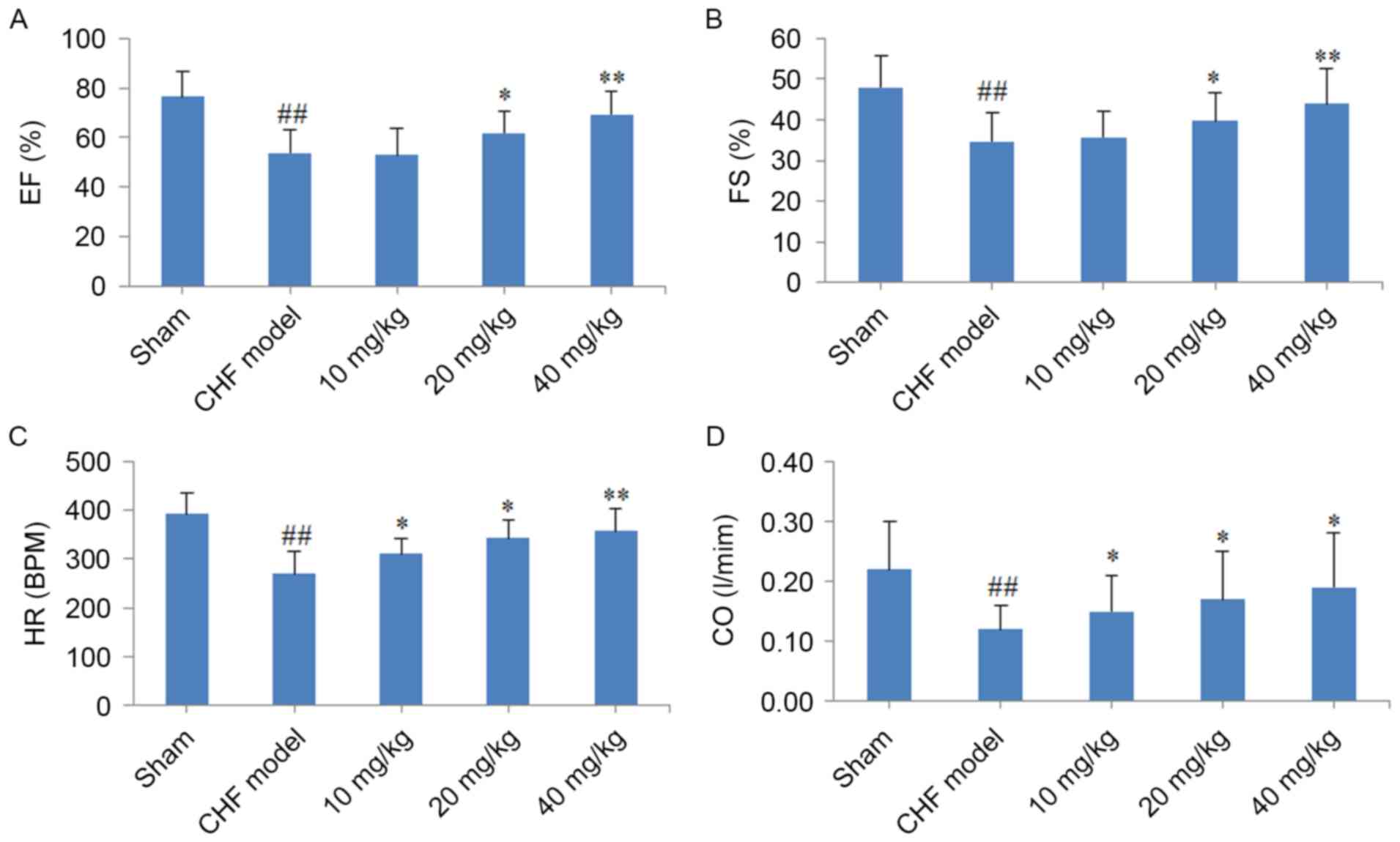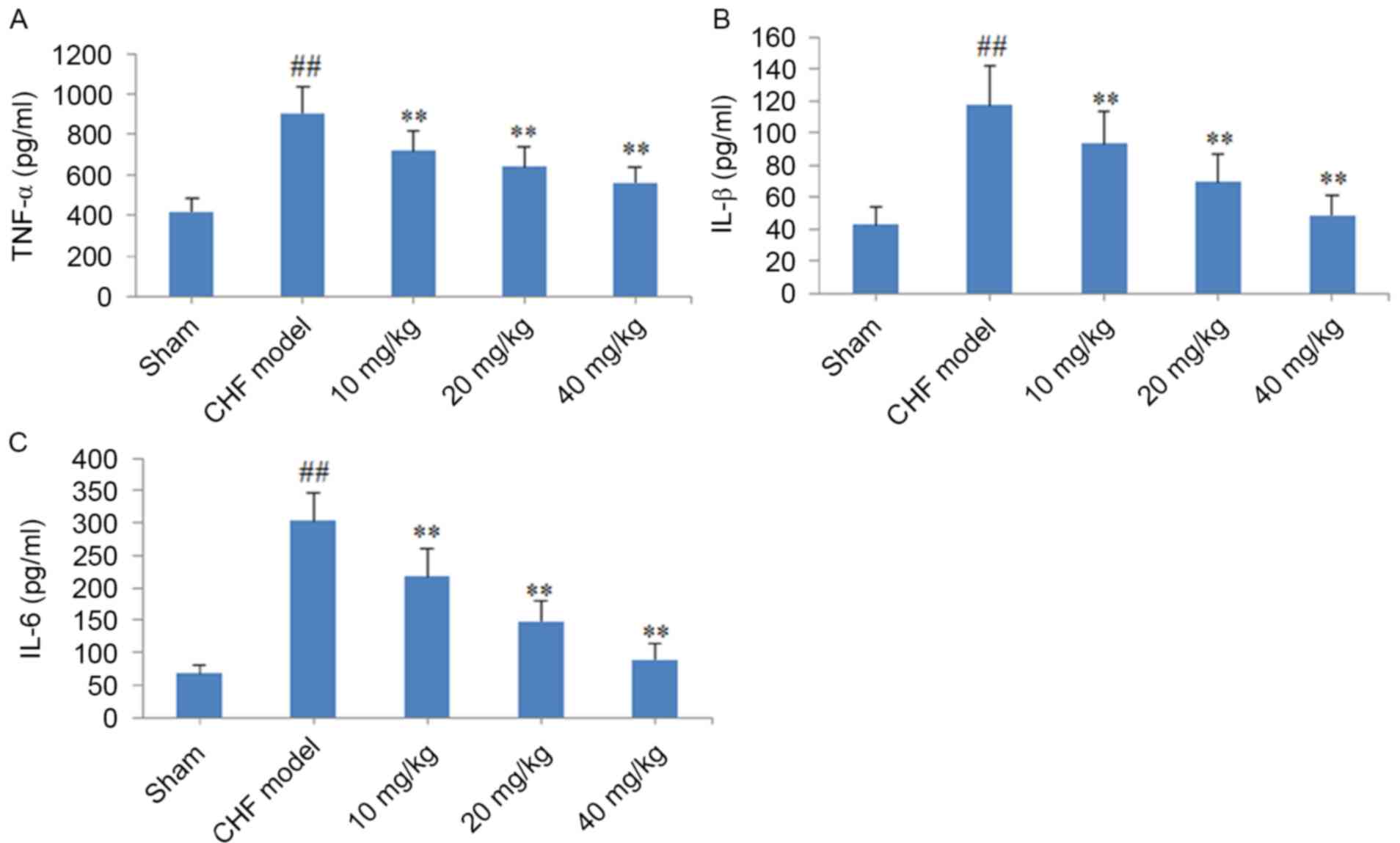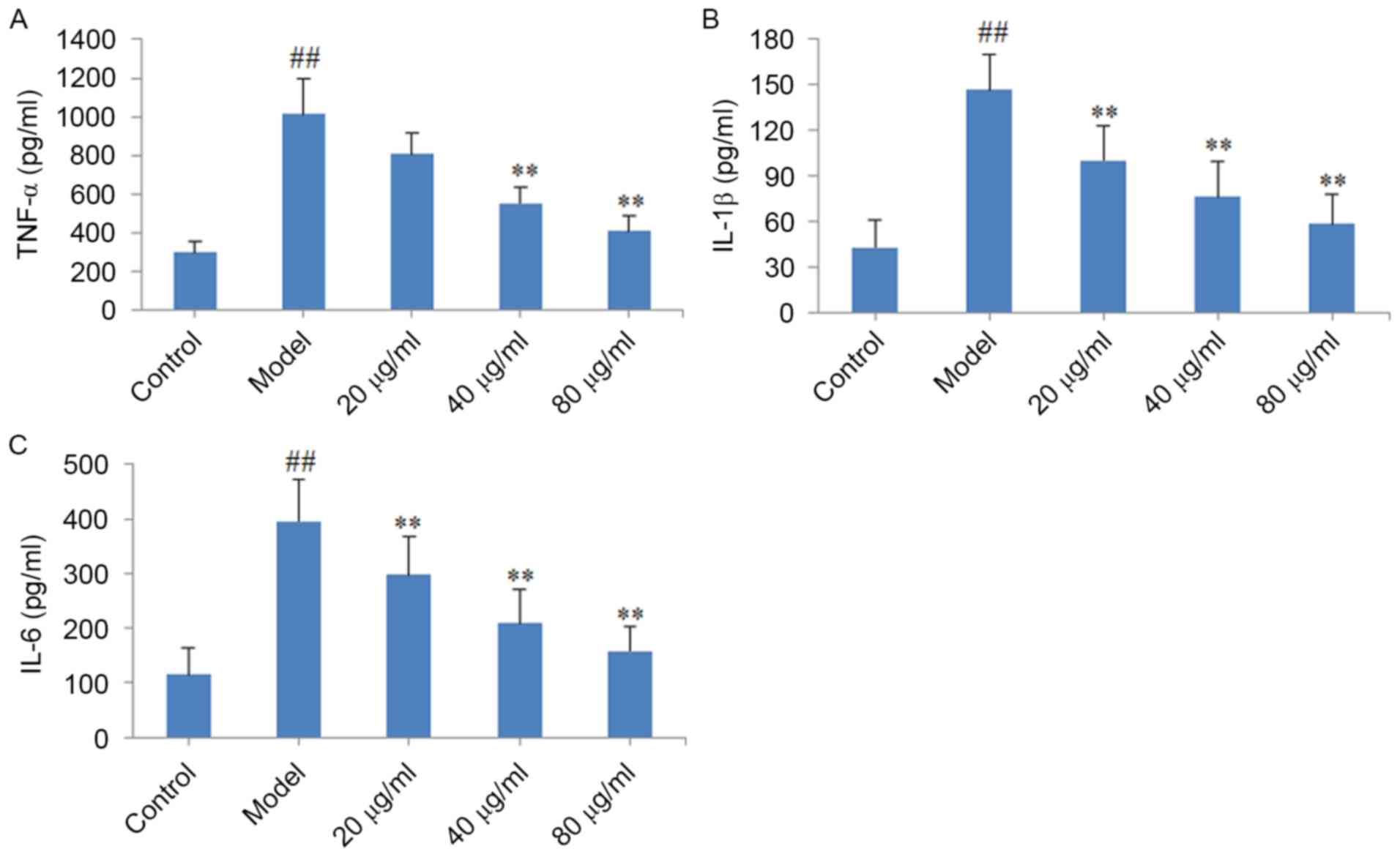|
1
|
Shimokawa H, Miura M, Nochioka K and
Sakata Y: Heart failure as a general pandemic in Asia. Eur J Heart
Fail. 17:884–892. 2015. View
Article : Google Scholar : PubMed/NCBI
|
|
2
|
Heusch G, Libby P, Gersh B, Yellon D, Böhm
M, Lopaschuk G and Opie L: Cardiovascular remodelling in coronary
artery disease and heart failure. Lancet. 383:1933–1943. 2014.
View Article : Google Scholar : PubMed/NCBI
|
|
3
|
Owan TE, Hodge DO, Herges RM, Jacobsen SJ,
Roger VL and Redfield MM: Trends in prevalence and outcome of heart
failure with preserved ejection fraction. N Engl J Med.
355:251–259. 2006. View Article : Google Scholar : PubMed/NCBI
|
|
4
|
Li X, Zhang J, Huang J, Ma A, Yang J, Li
W, Wu Z, Yao C, Zhang Y, Yao W, et al: A multicenter, randomized,
double-blind, parallel-group, placebo-controlled study of the
effects of qili qiangxin capsules in patients with chronic heart
failure. J Am Coll Cardiol. 62:1065–1072. 2013. View Article : Google Scholar : PubMed/NCBI
|
|
5
|
Guo N, Yang D, Wang X, Dai J, Wang M and
Lei Y: Metabonomic study of chronic heart failure and effects of
Chinese herbal decoction in rats. J Chromatogr A. 1362:89–101.
2014. View Article : Google Scholar : PubMed/NCBI
|
|
6
|
Parang P, Singh B and Arora R: Metabolic
modulators for chronic cardiac ischemia. J Cardiovasc Pharmacol
Ther. 10:217–223. 2015. View Article : Google Scholar
|
|
7
|
Marcinkiewicz-Siemion M, Ciborowski M,
Kretowski A, Musial WJ and Kaminski KA: Metabolomics-a wide-open
door to personalized treatment in chronic heart failure? Int J
Cardiol. 219:156–163. 2016. View Article : Google Scholar : PubMed/NCBI
|
|
8
|
Ferrer Piloto J, Cozzi R, Cornetta T,
Stano P, Fiore M, Degrassi F, De Salvia R, Remigio A, Francisco M,
Quiñones O, et al: Xanthium strumarium L. extracts produce DNA
damage mediated by cytotoxicity in in vitro assays but does not
induce micronucleus in mice. Biomed Res Int.
2014:5751972014.PubMed/NCBI
|
|
9
|
Chen F, Hao F, Li C, Gou J, Lu D, Gong F,
Tang H and Zhang Y: Identifying three ecological chemotypes of
Xanthium strumarium glandular trichomes using a combined NMR and
LC-MS method. PLoS One. 8:e766212013. View Article : Google Scholar : PubMed/NCBI
|
|
10
|
Han T, Li HL, Zhang QY, Han P, Zheng HC,
Rahman K and Qin LP: Bioactivity-guided fractionation for
anti-inflammatory and analgesic properties and constituents of
Xanthium strumarium L. Phytomedicine. 14:825–829. 2007. View Article : Google Scholar : PubMed/NCBI
|
|
11
|
Peng W, Ming QL, Han P, Zhang QY, Jiang
YP, Zheng CJ, Han T and Qin LP: Anti-allergic rhinitis effect of
caffeoylxanthiazonoside isolated from fruiats of Xanthium
strumarium L. in rodent animals. Phytomedicine. 21:824–829. 2014.
View Article : Google Scholar : PubMed/NCBI
|
|
12
|
Qin L, Han T, Li H, Zhang Q and Zheng H: A
new thiazinedione from Xanthium strumarium. Fitoterapia.
77:245–246. 2006. View Article : Google Scholar : PubMed/NCBI
|
|
13
|
Zhu GQ, Gao L, Li Y, Patel KP, Zucker IH
and Wang W: AT1 receptor mRNA antisense normalizes enhanced cardiac
sympathetic afferent reflex in rats with chronic heart failure. Am
J Physiol Heart Circ Physiol. 287:H1828–H1835. 2004. View Article : Google Scholar : PubMed/NCBI
|
|
14
|
Wang HJ, Zhang F, Zhang Y, Gao XY, Wang W
and Zhu GQ: AT1 receptor in paraventricular nucleus mediates the
enhanced cardiac sympathetic afferent reflex in rats with chronic
heart failure. Auton Neurosci. 121:56–63. 2015. View Article : Google Scholar
|
|
15
|
Xing L, Jiang M, Dong L, Gao J, Hou Y, Bai
G and Luo G: Cardioprotective effects of the YiQiFuMai injection
and isolated compounds on attenuating chronic heart failure via
NF-κB inactivation and cytokine suppression. J Ethnopharmacol.
148:239–245. 2013. View Article : Google Scholar : PubMed/NCBI
|
|
16
|
Yang C, Wu K, Li SH and You Q: Protective
effect of curcumin against cardiac dysfunction in sepsis rats.
Pharm Biol. 51:482–487. 2013. View Article : Google Scholar : PubMed/NCBI
|
|
17
|
Badole SL, Chaudhari SM, Jangam GB,
Kandhare AD and Bodhankar SL: Cardioprotective activity of Pongamia
pinnata in streptozotocin-nicotinamide induced diabetic rats.
Biomed Res Int. 2015:4032912015. View Article : Google Scholar : PubMed/NCBI
|
|
18
|
Gu M, Zheng AB, Jin J, Cui Y, Zhang N, Che
ZP, Wang Y, Zhan J and Tu WJ: Cardioprotective effects of genistin
in rat myocardial ischemia-reperfusion injury studies by regulation
of P2X7/NF-κB pathway. Evid Based Complement Alternat Med.
2016:53812902016. View Article : Google Scholar : PubMed/NCBI
|
|
19
|
Xia A, Xue Z, Li Y, Wang W, Xia J, Wei T,
Cao J and Zhou W: Cardioprotective effect of betulinic acid on
myocardial ischemia reperfusion injury in rats. Evid Based
Complement Alternat Med. 2014:5737452014. View Article : Google Scholar : PubMed/NCBI
|
|
20
|
Hu T, Wei G, Xi M, Yan J, Wu X, Wang Y,
Zhu Y, Wang C and Wen A: Synergistic cardioprotective effects of
Danshensu and hydroxysafflor yellow A against myocardial
ischemia-reperfusion injury are mediated through the Akt/Nrf2/HO-1
pathway. Int J Mol Med. 38:83–94. 2016. View Article : Google Scholar : PubMed/NCBI
|
|
21
|
Saini HK, Xu YJ, Zhang M, Liu PP,
Kirshenbaum LA and Dhalla NS: Role of tumour necrosis factor-alpha
and other cytokines in ischemia-reperfusion-induced injury in the
heart. Exp Clin Cardiol. 10:213–222. 2015.
|
|
22
|
Yuan X, Niu HT, Wang PL, Lu J, Zhao H, Liu
SH, Zheng QS and Li CG: Cardioprotective effect of Licochalcone D
against myocardial ischemia/reperfusion injury in
langendorff-perfused rat hearts. PLoS One. 10:e01283752015.
View Article : Google Scholar : PubMed/NCBI
|
|
23
|
Garcia I, Olleros ML, Quesniaux VF, Jacobs
M, Allie N, Nedospasov SA, Szymkowski DE and Ryffel B: Roles of
soluble and membrane TNF and related ligands in mycobacterial
infections: Effects of selective and non-selective TNF inhibitors
during infection. Adv Exp Med Biol. 691:187–201. 2011. View Article : Google Scholar : PubMed/NCBI
|
|
24
|
Han Y, Zhou M, Xing L, Jiang M, Bai G and
Luo G: Identification of NF-κB inhibitors in Qishenyiqi dropping
pills for myocardial infarction treatment based on
bioactivity-integrated UPLC-Q/TOF MS. Biomed Chromatogr.
29:1612–1618. 2015. View
Article : Google Scholar : PubMed/NCBI
|
|
25
|
He CL, Yi PF, Fan QJ, Shen HQ, Jiang XL,
Qin QQ, Song Z, Zhang C, Wu SC, Wei XB, et al: Xiang-Qi-Tang and
its active components exhibit anti-inflammatory and anticoagulant
properties by inhibiting MAPK and NF-κB signaling pathways in
LPS-treated rat cardiac microvascular endothelial cells.
Immunopharmacol Immunotoxicol. 35:215–224. 2013. View Article : Google Scholar : PubMed/NCBI
|
|
26
|
Shi Q, Cao J, Fang L, Zhao H, Liu Z, Ran
J, Zheng X, Li X, Zhou Y, Ge D, et al: Geniposide suppresses
LPS-induced nitric oxide, PGE2 and inflammatory cytokine by
downregulating NF-κB, MAPK and AP-1 signaling pathways in
macrophages. Int Immunopharmacol. 20:298–306. 2014. View Article : Google Scholar : PubMed/NCBI
|





















